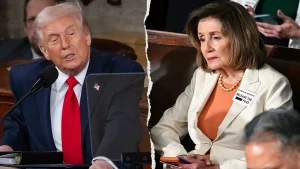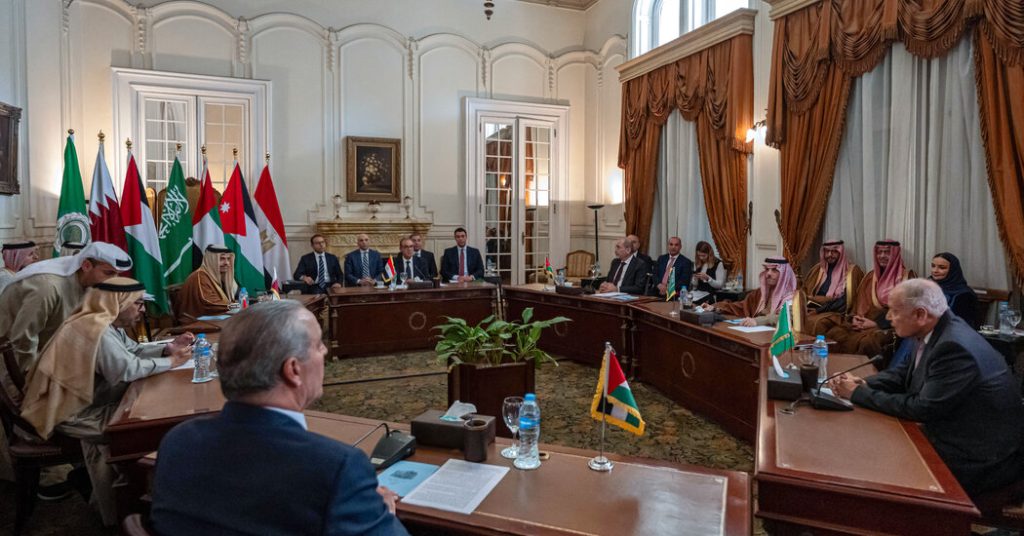In recent days, former President Donald Trump has sparked significant debate in the Middle East after suggesting that Palestinians living in Gaza should be relocated to Egypt and Jordan—an idea that has been met with unified resistance from Arab nations. Trump’s remarks, made amidst the ongoing humanitarian crisis and destruction in Gaza following the Hamas-led assault on Israel in October 2023, have highlighted deep-rooted historical wounds, raised fears of further instability, and underscored the daunting complexity of peace in the region.
To provide some context, Gaza, a densely populated territory with over two million residents, has endured unmatched devastation and loss of life since Israeli military operations began in retaliation for the October 7 Hamas attacks. Against this backdrop, Trump has floated the proposition that Palestinian Gazans could be evacuated to neighboring Jordan or Egypt, either on a temporary or possibly long-term basis. While Trump did not clarify the scale of relocation he envisions, his words suggested wide-scale population transfers, raising alarm bells across the Arab world.
“Something has to happen, but it’s literally a demolition site right now,” he remarked, referring to Gaza. Echoing a position taken by some on Israel’s far right, Trump’s comments seemed to suggest a plan of “cleaning out” Gaza—a notion that evokes haunting memories of the forced displacement of Palestinians during the establishment of Israel in 1948. At that time, hundreds of thousands of Palestinians fled or were expelled from their homes, many of them ultimately becoming refugees in neighboring Arab countries. To this day, their descendants—numbering millions—remain refugees, yearning for the right to return to their ancestral lands.
### Arab Nations Reject Trump’s Relocation Proposal
Unsurprisingly, Trump’s suggestion has been met with firm backlash from Arab nations. In an unprecedented show of unity, countries including Egypt, Jordan, Saudi Arabia, and Qatar, along with the Palestinian Authority and the Arab League, issued a joint statement condemning any plan to relocate Palestinians from their homes. Although the statement did not explicitly mention Trump, it made clear that the concept of the forced or voluntary uprooting of Palestinians would be disastrous for the region.
The Arab foreign ministers, who met in Cairo to draft the statement, underscored their stance: such a move would further destabilize the Middle East, sow discord, and undermine any prospect for peace. They reaffirmed their support for a two-state solution, emphasizing the need for a workable peace plan that guarantees Palestinians’ right to self-determination and an independent state.
Cultural and historical sensitivities amplify this rejection. For Palestinians, the specter of being driven from Gaza to neighboring territories evokes a painful history of displacement that they are keenly determined not to repeat.
### Egypt and Jordan Stand Firm
Both Egypt and Jordan, two critical players in Middle Eastern diplomacy, rejected Trump’s relocation suggestion emphatically. These countries have much at stake: both are neighboring nations with peace treaties with Israel, and both already host substantial populations of Palestinian refugees from earlier conflicts. For them, hosting additional waves of displaced Palestinians would pose significant political, social, and economic challenges.
Egypt has already taken in more than 100,000 Gazans since the start of the current conflict. Yet, Egyptian President Abdel Fattah el-Sisi has reiterated his country’s refusal to allow large-scale resettlement of Gazans, voicing concerns that it could irreversibly alter the demographic dynamics of Egypt and lead to domestic unrest.
Similarly, Jordan, home to a massive population of longstanding Palestinian refugees, is walking a fine line. Queen Rania of Jordan recently framed the ongoing crisis in Gaza as a test of global morality, still voicing her country’s strong opposition to any permanent influx of Palestinians. Their stance reflects fears about upsetting fragile domestic balances and fueling tensions within their borders.
### Broader Implications for Peace Efforts
Trump’s comments and the wider uproar over them have implications beyond the immediate humanitarian crisis. His suggestion casts a spotlight on the complicated dynamics between Arab nations, Israel, and the United States, especially as the Trump administration strives to broker a comprehensive regional peace accord. This ambition includes normalizing relations between Israel and Saudi Arabia—a goal pursued by the former president during his first term and revisited in his current bid for geopolitical influence in the Middle East.
However, the ongoing war in Gaza, which has claimed tens of thousands of lives, has altered the diplomatic landscape. Anger over the violence and humanitarian crisis has reignited global attention on the unresolved question of Palestinian statehood, with many Arab nations doubling down on their insistence that no normalization with Israel can occur without addressing this fundamental issue. Crown Prince Mohammed bin Salman of Saudi Arabia recently reiterated this position, stating that establishing a Palestinian state is non-negotiable for any Saudi-Israeli diplomatic normalization.
The United States finds itself in a delicate position. Egypt and Jordan are long-time, critical U.S. allies, receiving considerable American aid and playing a key role in the strategic stability of the region. Egypt, in particular, is the second-largest recipient of U.S. foreign aid after Israel. Any plan or commentary that undermines Cairo or Amman’s stability could strain these partnerships, which are vital to Washington’s broader Middle East strategy.
### Human Costs and Historical Parallels
To fully understand the alarm raised by Trump’s remarks, we must consider the human cost and historical echoes they evoke. Gaza is among the world’s most densely populated places, its people hemmed in by Israeli and Egyptian blockades for years. With its infrastructure decimated and its population enduring immense suffering, the idea of leaving their homeland—whether temporarily or permanently—is not just politically inflammatory but an existential concern for Palestinians.
The memories of 1948 loom large. During the Nakba, or “catastrophe,” hundreds of thousands of Palestinians were forced from their homes in what would become Israel. Seventy-five years later, many remain stateless, clinging to the hope of one day returning. Trump’s suggestion, even if theoretically humanitarian, risks reopening these historical wounds and hardening the sentiment that Palestinians are expected to disappear to make way for broader geopolitical resolutions.
### What Comes Next?
Arab nations, along with the international community, are now watching to see whether Trump’s administration will refine or walk back these comments, especially in light of the backlash. While his previous term’s “peace plan” encountered criticism from Palestinians for falling short of offering a viable state, his vision for Gaza and the West Bank in this term remains opaque.
The Arab League has expressed openness to working with the U.S. administration on a peace process but remains steadfast in its support for a two-state solution. Meanwhile, the escalating violence and deepening humanitarian crisis in Gaza render these diplomatic aspirations increasingly urgent but equally challenging to realize.
Adding to the complexity is the fact that millions of existing refugees already live in camps across Jordan, Lebanon, Syria, and Egypt. The idea of adding to these numbers—particularly with no clear pathway for their eventual resettlement and return—feels, to many regional leaders, like a recipe for extended conflict rather than a solution.
### Final Thoughts
Trump’s call to relocate Gaza’s population, framed as a potential stopgap in the context of war, has shocked and unified Arab nations against the proposal. More than anything, it highlights the enduring fragility of the Middle East and the generational scars carried by its people. While Trump once courted Arab leaders with the promise of historic breakthroughs in diplomacy, his recent comments may risk alienating those same partners.
In the end, any resolution for Gaza and the broader Israeli-Palestinian conflict must grapple with the profound human stories and histories behind the political narratives—acknowledging persecution without perpetuating it, and seeking peace without erasing identity. Only then can a durable solution emerge.









